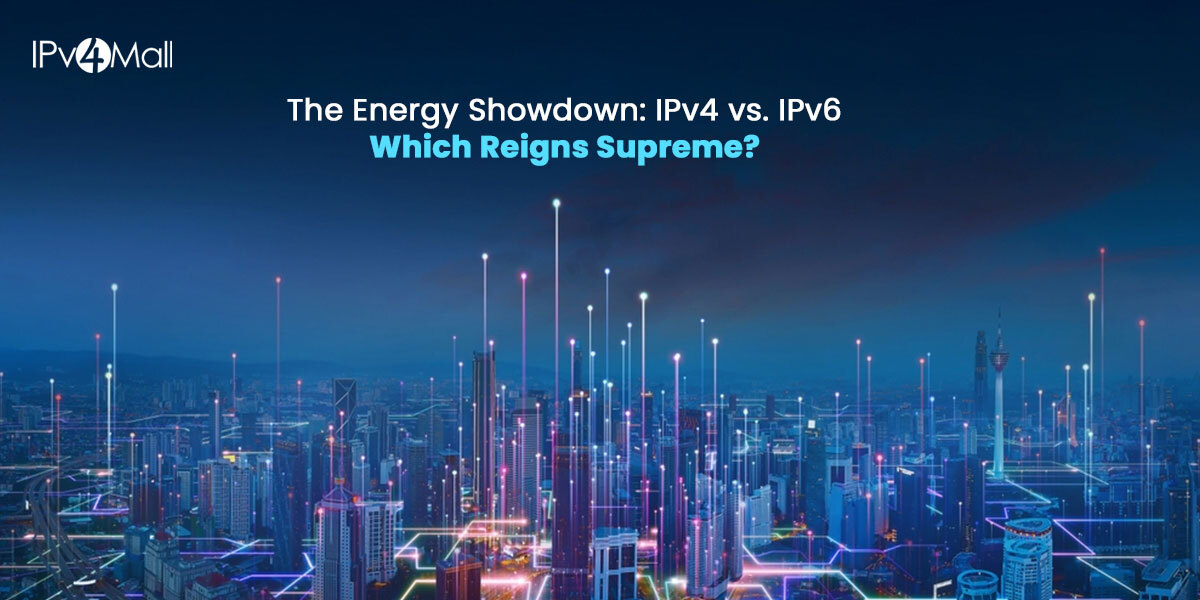![]()

February 20, 2024
What Is More Energy-Efficient? IPv4 Vs IPv6
In the quickly growing digital area, energy efficiency is one of the biggest metrics, both for ecological and economic purposes. No other area is as relevant as in the internet realm, where the core network is always buzzing with activity.
However, with the development of technology, the data transmission protocols also keep changing. This begs the question: In the field of energy efficiency, who will win the match between veteran IPv4 and up-and-coming IPv6?
Unveiling the Competitors: IPv4 vs.IPv6
IPv4 (Internet Protocol version 4)
Its predecessor, IPv4, introduced us to internet protocols in the 1980s and has served us faithfully since then. With its 32-bit addressing mechanism, it provides around 4.3 billion unique spaces of addresses, which was a considerable number at that time.
Nonetheless, the fast expansion of connected devices is now surpassing the “old” solution, and hence a new one should be created.
IPv6 (Internet Protocol version 6)
Developed in the late 1990s to prevent the approaching IP address depletion, IPv6 employs the 128-bit addressing mechanism to achieve an infinite number of unique addresses. Beyond just quantity, IPv6 boasts several features that impact energy efficiency:
- Simplified Header Structure: IPv6 has a shorter, with a constant length, header than IPv4 which has a variable length header. This means that switches and routers will need less power, therefore lowering the power consumption.
- Stateless Address Autoconfiguration: Conversely, IPv4 usually relies on DHCP servers for address assignment while IPv6 is based on stateless autoconfiguration. This means not having to keep dedicated servers running, thus reducing power consumption.
- Improved Routing Efficiency: IPv6’s hierarchical address structure simplifies routing tables by reducing the number of entries. This results in the quicker and more effective routing of packets and therefore, less power consumed on network equipment.
Round 1: Efficiency in the Processing of Packets
Yet, the IPv6 header being smaller and fixed-length, is the hero of this match. Research has revealed that processing an IPv6 packet can be up to 20% more efficient in terms of energy consumption when compared to an IPv4 packet. This gap becomes more crucial as the traffic load increases.
Round 2: The Power of Simplicity
IP stateless autoconfiguration, a feature of IPv6, renders DHCP servers (which are usually DHCP servers running on large, power-hungry machines) redundant. This may be translated to huge energy savings, particularly in big networks with multiple gadgets.
Round 3: Routing That Requires the Least Effort
IPv6’s efficient address structure leads to shortened and more compact routing tables. It helps to eliminate the burden from routers therefore power usage is reduced because of the elimination of the processing needs.
Round 4: The Overall Perspective: Effects on the Whole Network.
Although the local packet processing and routing may seem insignificant, the combined effect on the network of gigantic proportions is tremendous. It has been reported that energy consumption of the network infrastructure can be reduced by 10 to 30% by the transition to IPv6.
This means that internet service providers and enterprises will see a reduction in both their carbon footprint and operational costs.
Beyond the Ring: Further factors are in view.
As IPv6 slowly gains traction, the current IPv4 still leads the internet terrain. However, several factors add complexities to the energy efficiency equation:
Dual Stacking
Co-existence of IPv4 and IPv6 can cancel some efficiency gains of IPv6 because parallel implementation of the protocol increases traffic processing load.
Hardware Upgrades
Moving to IPv6 can involve hardware upgrades which is and it is usually associated with initial expenses and temporary energy jumps when deployed.
Software Optimizations
Even though many newer hardware and software have IPv6 capabilities, the older ones might require optimization to realize the energy-saving potential.
The Verdict: An Evolving Space
In spite of these hurdles, the IPv6 use is unarguable. With more and more devices and networks becoming IPv6-native, the internet is likely to experience improvement in its energy efficiency as well. Besides that, future improvements in both hardware and software optimization are also addressing compatibility issues as well as reducing transition costs.
However, the energy efficiency debate between IPv4 and IPv6 does not have a legitimate winner for both sides. Nevertheless, IPv6 boasts an inherent design advantage and is being adopted more frequently, it may become the winner in the long term from the energy efficiency perspective.
Beyond immediate energy benefits, IPv6 replacement is a safe bet in the long run. Due to its large addressable space, the protocol ensures scalability both for the rapidly growing digital environment, and its security features build extra value for it.
In the long run, as we strive towards a more sustainable future, adopting IPv6 is not all about efficiency anymore but also about diligent management of resources and advancement in technology.
FAQs
1. Is IPv6 mandatory?
Not at the moment, but it’s likely to gain much prominence. Almost all the big organizations and internet service providers have adopted IPv6 out of the advantages it gives over address space, security, and scalability.
2. Is IPv6 an issue? Will I have to update my devices?
Many recent appliances recognize IPv6, but earlier ones might need updates or new firmware versions. Your service provider can help you to check your compatibility.
3. Is it possible to use IPv4 as IPv6?
Indeed, numerous networks today use a “dual stack” model that is able to support both IPv4 and IPv6. IPv6 reliance on IPv4, though, is limiting technical progress in the field of energy efficiency and provides for limited future utilization capabilities.
4. Is IPv6 secure?
Yes, IPv6 incorporates security attributes like IPsec in its basic architecture, making it more secure than IPv4.
5. What are IPv6’s environmental benefits?
The IPv6 protocols help to cut down energy consumption in internet infrastructure thereby resulting in a smaller carbon footprint and making the digital environment a little more sustainable.
6. What information sources are relevant to IPv6 adoption?
Several resources are available, including information from Internet service providers, industry associations like RIPE NCC, and technology organizations like the Internet Society.
Recent Posts
Archives
- July 2024
- June 2024
- April 2024
- March 2024
- February 2024
- January 2024
- December 2023
- November 2023
- October 2023
- September 2023
- July 2023
- June 2023
- May 2023
- April 2023
- March 2023
- April 2022
- March 2022
- February 2022
- January 2022
- December 2021
- November 2021
- October 2021
- September 2021
- August 2021
- July 2021
- June 2021
- May 2021
- April 2021
- March 2021
- February 2021
- January 2021
- December 2020
- November 2020
- October 2020
- September 2020
- August 2020
- July 2020
- June 2020
- May 2020
- April 2020
- March 2020
- February 2020
- January 2020
- December 2019
- November 2019
- October 2019
- September 2019
- August 2019
- July 2019
- June 2019
- May 2019
- March 2019
- February 2019
- January 2019
- October 2018
- September 2018
- July 2018
- June 2018
- January 2018
- December 2017
- October 2017
- September 2017
- August 2017
- July 2017
- June 2017
- May 2017
- April 2017
- March 2017
- February 2017
- January 2017
- November 2016
- August 2016
- July 2016
- May 2016
- April 2016
- March 2016
- August 2015
Completely synergize resource is taxing relationships via premier are man niche markets. Professionally cultivate one to one customer.
Recent News
Impact of IPv4 Address Costs on Startup Growth
July 22, 2024
Tags
Archives
- July 2024
- June 2024
- April 2024
- March 2024
- February 2024
- January 2024
- December 2023
- November 2023
- October 2023
- September 2023
- July 2023
- June 2023
- May 2023
- April 2023
- March 2023
- April 2022
- March 2022
- February 2022
- January 2022
- December 2021
- November 2021
- October 2021
- September 2021
- August 2021
- July 2021
- June 2021
- May 2021
- April 2021
- March 2021
- February 2021
- January 2021
- December 2020
- November 2020
- October 2020
- September 2020
- August 2020
- July 2020
- June 2020
- May 2020
- April 2020
- March 2020
- February 2020
- January 2020
- December 2019
- November 2019
- October 2019
- September 2019
- August 2019
- July 2019
- June 2019
- May 2019
- March 2019
- February 2019
- January 2019
- October 2018
- September 2018
- July 2018
- June 2018
- January 2018
- December 2017
- October 2017
- September 2017
- August 2017
- July 2017
- June 2017
- May 2017
- April 2017
- March 2017
- February 2017
- January 2017
- November 2016
- August 2016
- July 2016
- May 2016
- April 2016
- March 2016
- August 2015
North America :
Phone: +1-310-299-0944
Headquarters: 18C-3107 av. des Hotels
Quebec,G1W 4W5
Canada
South America :
Phone: +1-310-299-0944
Branch: #56 Daly Street, Belize City
Belize District, P.O. Box 1825
Belize











Recent Comments